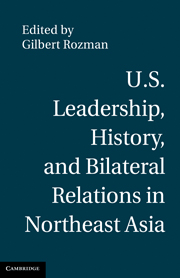Book contents
- Frontmatter
- Contents
- List of Contributors
- Acknowledgments
- U.S. Leadership, History, and Bilateral Relations in Northeast Asia
- Introduction
- PART I HISTORICAL MEMORIES AND BILATERAL TIES WITH ALLIES
- 1 Japan's Historical Memory toward the United States
- 2 Values and History in U.S.–South Korean Relations
- 3 U.S. Leadership, History, and Relations with Allies
- PART II HISTORICAL MEMORIES, JAPANESE–SOUTH KOREAN RELATIONS, AND U.S. VALUES
- PART III HISTORICAL MEMORIES, SINO–SOUTH KOREAN RELATIONS, AND U.S. VALUES
- Index
2 - Values and History in U.S.–South Korean Relations
from PART I - HISTORICAL MEMORIES AND BILATERAL TIES WITH ALLIES
Published online by Cambridge University Press: 01 March 2011
- Frontmatter
- Contents
- List of Contributors
- Acknowledgments
- U.S. Leadership, History, and Bilateral Relations in Northeast Asia
- Introduction
- PART I HISTORICAL MEMORIES AND BILATERAL TIES WITH ALLIES
- 1 Japan's Historical Memory toward the United States
- 2 Values and History in U.S.–South Korean Relations
- 3 U.S. Leadership, History, and Relations with Allies
- PART II HISTORICAL MEMORIES, JAPANESE–SOUTH KOREAN RELATIONS, AND U.S. VALUES
- PART III HISTORICAL MEMORIES, SINO–SOUTH KOREAN RELATIONS, AND U.S. VALUES
- Index
Summary
The U.S.–South Korean bilateral relationship has increasingly become more than a matter of military alliance or economic relations, although security and trade are still the two defining issues. As a result, it has become much more complex and challenging to manage. With emphasis on Korean reasoning about values influenced by memories of history, this chapter explores relations in the first decade of the twenty-first century between Washington, in search of a response to a more insecure world, and Seoul, newly attentive to fellow Koreans in the North and to a regional role in dynamic Northeast Asia.
Largely based on state-to-state interactions, U.S.–Republic of Korea (ROK) relations until the 1970s remained robust if not free of tension and conflict. If a rift occurred, it centered on policy matters such as U.S. plans to withdraw troops from the peninsula. South Koreans did not question the rationale for the military alliance, and any anti-American voice was immediately suppressed by the authoritarian regimes that ruled the country. For instance, discussing the killings of civilians by U.S. troops during the Korean War, which would become a hot issue later, was taboo in the highly anticommunist state. U.S. cooperation with authoritarian regimes during the cold war era occurred in sync with its lead on matters of national security.
Things began to change as South Koreans struggled to realize democratization, led by the development of a vibrant civil society, along with the end of the cold war, which undermined the rationale for anticommunism.
- Type
- Chapter
- Information
- Publisher: Cambridge University PressPrint publication year: 2010

